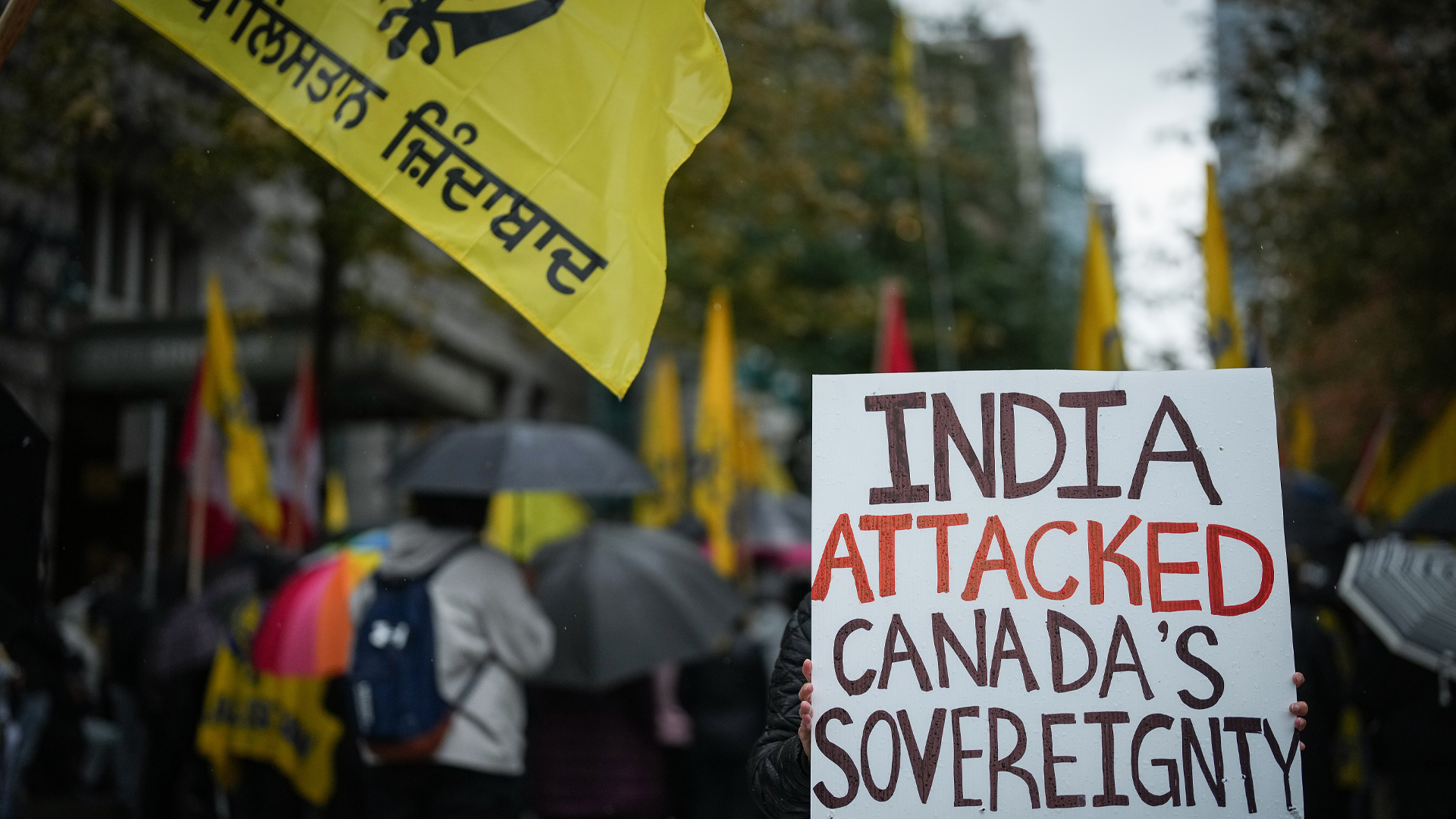
The dispute between Canada and India over the killing of Sikh leader Hardeep Singh Nijjar in British Columbia has strained relations between these two “like-minded” democracies to an unforeseen degree.
It has also posed serious problems for Canada’s allies, at least partly because of their desire to use India as a vital counterweight to China in the region.
The United States Ambassador to Canada, David Cohen, confirms it was information gathered by the Five Eyes – an intelligence-sharing coalition of the U.S., Canada, the U.K., Australia and New Zealand – about the role that the Indian government may have played in the killing that led to Prime Minister Justin Trudeau’s startling statement that touched off the dispute.
Cohen’s comments are the latest sign that Canada’s allies are now offering some support for Ottawa’s position, after a period where it appeared they were at best, lukewarm, and at worst, not interested in confronting India – including the fact that Britain said it would persist in trade negotiations with New Delhi.
It was concerning to see the apparent initial hesitancy among Canada’s close allies in addressing the situation with India. While economic and geopolitical interests are undoubtedly essential, one must wonder where the line is drawn when it comes to upholding shared values and principles.
The Indian government’s vehement denials and swift retaliatory actions against Canada could lead to further negative political, economic and other consequences. This is especially complicated given the deep ties between the two countries and India’s role as a critical partner in Canada’s Indo-Pacific strategy.
However, Ottawa must stand firm and prioritize long-term democratic principles over short-term economic gains.
The world has already witnessed the perils of compromising on core principles for immediate economic benefits, with China serving as a cautionary tale. Embracing Beijing for its economic prowess while downplaying criticism of its human rights violations and autocratic governance has led to a range of geopolitical challenges and economic instability.
The public dispute began when Trudeau said Canadian authorities are investigating “credible allegations” about the Indian government’s possible role in the killing of Nijjar.
India has repeatedly dismissed Ottawa’s charges, accused Canada of being a safe haven for “Sikh terrorists,” expelled a senior Canadian diplomat, suspended visa services for Canadian citizens over what it said were “security threats” against its diplomats in Canada and urged its citizens to exercise “extreme caution” and “remain vigilant” while in Canada.
The increasingly heated dispute runs the risk of souring India’s relations not only with Canada but also with its Five Eyes and other allies, particularly as the U.S. increasingly backs Ottawa. That is causing concern in other world capitals.
India has a significant and growing role in both the geopolitical and economic arenas as a pivotal member of the Quadrilateral Security Dialogue – a strategic forum that includes the United States, Japan, India and Australia – all of which are interested in using India as a counterweight to China’s growing threats to the Indo-Pacific region.
The tactics India is now using against Canada are echoes of the past when it played hardball with other nations.
In the wake of the Galwan River border skirmishes in 2020, prominent Chinese brands such as Xiaomi, Oppo, Vivo and Lenovo faced scrutiny from the Indian government over alleged evasions of customs duties and GST.
In February 2023, following U.K. broadcasts critical of Prime Minister Narendra Modi, BBC India‘s offices in New Delhi and Mumbai were subjected to a three-day search by tax authorities.
Canada could now be facing similar threats. The federal government should warn Canadian companies operating in India about the possibility of it using tax laws against them.
But there are also bigger issues.
Since the Early Progress Trade Agreement (EPTA) stalled, formal economic co-operation between India and Canada has faced challenges. The EPTA, a transitional step towards the Comprehensive Economic Partnership Agreement (CEPA), was put on hold, leading to a pause in the CEPA negotiations after their relaunch in March 2022.
Despite those tensions in diplomatic relations, bilateral trade had been seemingly unaffected, at least until now, and had grown substantially in recent years, culminating in a trade volume of US$8.16 billion in 2022-23.
Canadian pension funds – as well as other investment entities such as the Caisse de dépôt et placement du Québec and the Ontario Teachers’ Pension Plan – have large investments in India. This has positioned India as the 29th largest recipient of Canadian foreign direct investment (FDI) globally in 2022.
The current tensions may also cast a shadow over the Canadian education and tourism sectors. India remains the most significant contributor of international students to Canada at about 40 per cent of all foreign students – a crucial revenue stream for Canadian educational institutions. If India continues to discourage tourism, that could affect many Canadian businesses.
The current dispute has roots that are decades old.
Canada is home to the largest Sikh diaspora worldwide, comprising 2.1 per cent of the population, a larger portion than in India where Sikhs constitute just 1.7 per cent. India has issued multiple complaints over the years about what it calls Canada’s reluctance to take action against “terrorists” on its soil.
There are also lingering shadows of the 1985 Air India bombing which resulted in the death of all 329 people aboard, the majority of whom were Canadians of Indian descent. Sikhs were blamed and the failure of criminal prosecutions in Canada related to that incident continues to bedevil the perceptions and dealings between the two nations almost four decades later.
In addition, the Sikh community’s prominence in Canadian politics – including former defence minister Harjit Sajjan and NDP leader Jagmeet Singh – means Canada’s interactions with India take a unique form compared to other G7 countries.
In 2017, Punjab’s Chief Minister, Capt. Amarinder Singh, declined a meeting with Canada’s then-defence minister Harjit Sajjan over alleged separatist ties. During Trudeau’s 2018 visit to India, tensions grew when Jaspal Atwal, convicted of a 1986 assassination attempt on an Indian state minister, was invited to a reception with Trudeau.
These incidents serve as clear reminders of the delicate balance that Canada must maintain in its diplomatic relations with India, given the intertwined histories and the prominent role of the Sikh community in Canadian political and social spheres.
While Canada and India historically enjoyed robust relations, the rise of Hindu nationalist sentiments under Modi’s Bharatiya Janata Party (BJP) has had profound implications, both domestically and internationally. Modi promotes a majoritarian agenda that critics argue often comes at the expense of minority rights.
His policies, which prioritize Hindu rights, have caused concern among India’s Muslim, Christian, Sikh and other minority communities. Modi has also been accused of suppressing dissent, curbing freedom of the press and manipulating the state apparatus for political gains.
Furthermore, the BJP’s approach to history and education – primarily its attempts to revise school textbooks to align more with its nationalist narrative – offers a clear indication of its intent to reshape India’s identity.
While many within India applaud these moves as a much-needed assertion of Hindu pride and the correction of historical injustices, these actions raise alarm bells about the erosion of the secular principles enshrined in India’s constitution and the potential sidelining of its diverse minority communities.
In the Indo-Pacific, Canada has core interests but weak clout
India, with its colonial history marred by subjugation and humiliation, carries an inherent wariness of Western intentions. This historical backdrop imbues the nation with an ambivalent nature, often juggling its colonial past and its aspirations as an emerging power.
While its democratic institutions, shared Commonwealth heritage and mutual linguistic ties provide a significant common ground with nations like Canada, the scars of its past, coupled with the nationalistic fervor of its present, can lead to a complex and sometimes unpredictable partnership.
India’s journey from being the “jewel in the crown” of the British Empire to a self-assured democratic republic has instilled a fierce sense of independence and self-reliance. Yet beneath this assertiveness, there remains a cautious approach to global alliances, rooted in a deep desire to never again be subordinated or undermined.
It’s against this background that Canada must forcefully, but carefully, make its next moves.
Defending the safety of Canadian citizens and the sovereignty of the nation are fundamental duties of the federal government.
Canada’s commitment to upholding democratic values is steadfast and enduring. Its unique relationship with India, shaped by Canadians whose origins lie in the Indian subcontinent, necessitates a nuanced approach.
Engaging with India requires a balance of shared values and mutual respect, while acknowledging the diverse influences stemming from Canadians of Indian origin. It is paramount that the foundation of this relationship remains anchored in mutual understanding, respect and shared democratic principles.
More reading on the future of Canadian diplomacy:
Finding Canada’s purpose in a shifting international order









